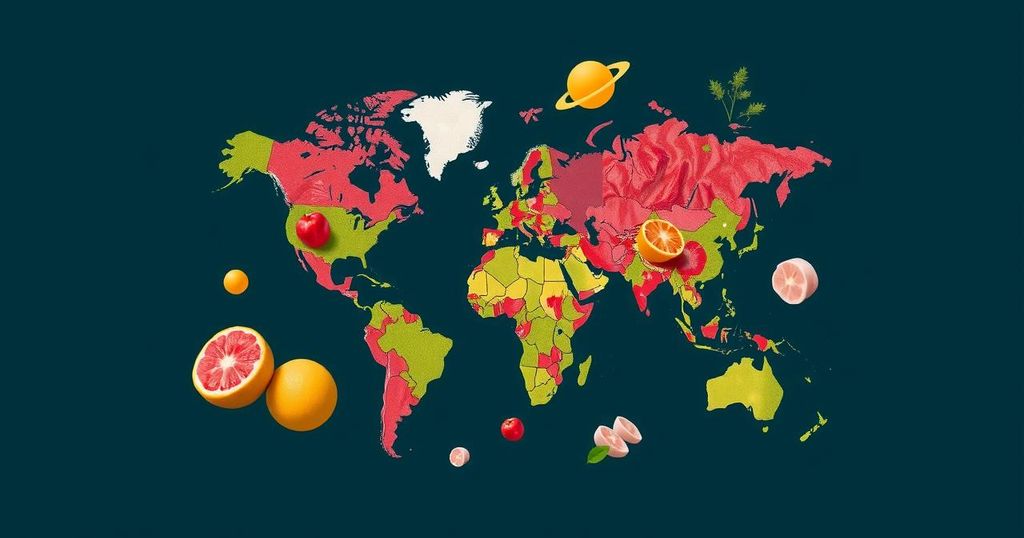At COP29 in Baku, Azerbaijan, the TAPP Coalition proposed a global meat tax to reduce animal protein consumption and mitigate greenhouse gas emissions. The coalition criticized several Western nations for their slow progress on food pricing policies while praising progressive countries. They urged key players to commit to dietary shifts and highlighted the importance of significant climate discussions at the conference amidst tensions from human rights concerns.
At the recent 2024 U.N. Climate Change Conference (COP29) in Baku, Azerbaijan, the TAPP Coalition proposed the implementation of a global meat tax as a means to combat climate change. The coalition, which advocates for sustainable food policies, argued that such a tax, in conjunction with subsidies for vegetables, could significantly mitigate the overconsumption of animal proteins and lower greenhouse gas emissions from the agricultural sector. Willem Branten, a policy officer with TAPP, underscored the importance of including commitments for dietary shifts in the conference’s concluding statements, appealing to major contributors such as the EU Commission and China to spearhead these initiatives. TAPP criticized nations including the United States, Australia, Canada, and the United Kingdom for lagging in the adoption of food pricing strategies aimed at reducing climate impact, while commending Switzerland, Denmark, and the EU for their progressive policies. The controversy surrounding COP29 is heightened by the participation of delegates from contentious nations, such as Afghanistan under Taliban control, marking their first appearance at a climate conference since the regime’s return to power in 2021. President Joe Biden opted not to attend personally but dispatched senior officials, including White House adviser John Podesta and Energy Secretary Jennifer Granholm, to represent U.S. interests during the discussions. The topic of a potential tax on meat was also examined in a report by the U.N. Food and Agriculture Organization (FAO), weighing the advantages and drawbacks of such a policy, further emphasizing TAPP’s advocacy at COP29. Willem Branten asserted, “We believe that COP29 and UNFCCC [United Nations Framework Convention on Climate Change] conferences thereafter can only be successful if the closing statement includes transitioning away from animal protein overconsumption according to national or global dietary guidelines by implementing greenhouse gas emission pricing mechanisms in agri-food systems.” TAPP’s strategy involves encouraging countries to support vegetable subsidies alongside raising awareness about global discrepancies in dietary policy implementations among U.N. member states. Although COP29 aims to address pressing climate issues, concerns about human rights violations in Azerbaijan, as highlighted by Amnesty International, cast a shadow over the proceedings. Additionally, recent studies indicate a significant increase in private jet travel associated with U.N. climate summits, raising questions regarding the environmental impacts of such gatherings. The TAPP Coalition expressed its commitment to pushing for meaningful dietary changes as part of global climate commitments in the hopes that substantive actions will emerge from this global forum.
The proposal for a global meat tax stems from growing concerns over the environmental impact of livestock production, particularly in relation to greenhouse gas emissions. The TAPP Coalition aims to initiate discussions that could ultimately lead to policy changes that reduce animal protein consumption. The conference serves as a crucial platform for countries to reassess their agricultural practices and adopt more sustainable food systems that align with climate goals. The backdrop of COP29 also includes global scrutiny regarding the involvement of various nations in climate discussions, particularly those with contentious human rights records.
The call from the TAPP Coalition for a global meat tax at COP29 highlights the urgent need to address climate change through dietary reforms. By advocating for taxation of meat and the promotion of vegetable subsidies, the coalition aims to shift national policies towards sustainable agricultural practices. The participation of various nations, coupled with the presence of controversial states, complicates the landscape of the conference, yet emphasizes the necessity for collaborative efforts in combating climate issues.
Original Source: www.shorenewsnetwork.com







